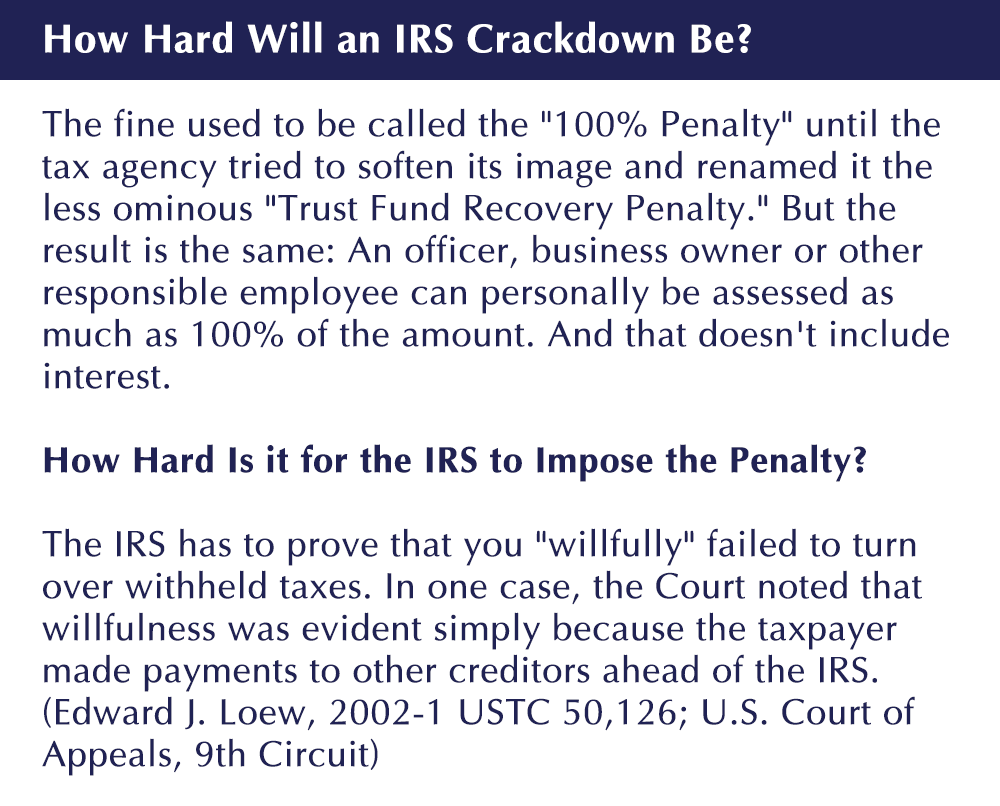If you operate a business that collects payroll taxes from employees, here’s a warning: Regardless of what your corporate financial situation is, don’t borrow from the withholding tax fund. If that money isn’t there when it’s due, Uncle Sam will crack down hard. All businesses face downturns when cash flow dries up. It may be tempting to look at payroll tax money as an easy fix to a cash crunch. “I’ll send it in later,” you may think. But when it comes to bad ideas, this is one of the worst.
How Hard Will an IRS Crackdown Be?
If the due date for making payroll tax deposits arrives and the money isn’t sent … the IRS will take action against the responsible parties. That money belongs to your employees and is meant to be held in a trust fund until deposited to pay income tax, Social Security and Medicare taxes.
Don’t assume the corporate veil will shield you or other corporate officers. Payroll taxes are one area where you cannot escape personal liability.
Suppose your business, which has five corporate officers, comes up $100,000 short in unpaid trust money. The IRS has to decide who willfully failed to make the payments. But often, the tax agency goes after the person who is the easiest to collect from. You may be unaware the tax deposits weren’t made. So if it turns out your four partners flee, you may be held responsible for the whole $100,000.
If there isn’t enough money to pay the bill, the IRS can attack your business bank accounts or assets. If there’s still a shortfall, you may find your business shut down and your assets seized and auctioned off. The IRS wants every cent.
Pretty bad news, right? There’s more. Even if your firm files for bankruptcy, the debt is not dischargeable.
Will the government send violators to jail? Not usually. But if the IRS sees a pattern of repeated violations, it can launch a criminal investigation, which could lead to prison.
The repercussions can spread beyond the company. There are legal precedents that allow the IRS to collect from, say, banks and financial institutions that lend you money to pay those taxes. And the agency can go after partners and other corporate executives, even if they weren’t active in running the company.
The easiest way out of a payroll mess is to avoid getting into one in the first place. If you’re involved in a small- or medium-sized business, it can be a good idea to hire an outside service to handle payroll duties. A good payroll service provider relieves you of an enormous burden by cutting the checks, making the deductions, taking care of the tax payments and handling recordkeeping. But don’t be lulled into feeling like your payroll is on autopilot. Payroll needs regular monitoring. If a shortfall occurs, your company, not the payroll provider, will bear the ultimate responsibility. If you want help with your small business accounting services, we have a team of experts to help. Fill out the form below and we’ll reach out to you soon.

Contact Us
© 2024 CPA Site Solutions.
Disclaimer of Liability
Our firm provides the information in this article for general guidance only, and does not constitute the provision of legal advice, tax advice, accounting services, investment advice or professional consulting of any kind. The information provided herein should not be used as a substitute for consultation with professional tax, accounting, legal or other competent advisors. Before making any decision or taking any action, you should consult a professional advisor who has been provided with all pertinent facts relevant to your particular situation. Tax articles in this blog are not intended to be used, and cannot be used by any taxpayer, for the purpose of avoiding accuracy-related penalties that may be imposed on the taxpayer. The information is provided “as is,” with no assurance or guarantee of completeness, accuracy or timeliness of the information, and without warranty of any kind, express or implied, including but not limited to warranties of performance, merchantability and fitness for a particular purpose.
Blog
Nonprofit Insights

